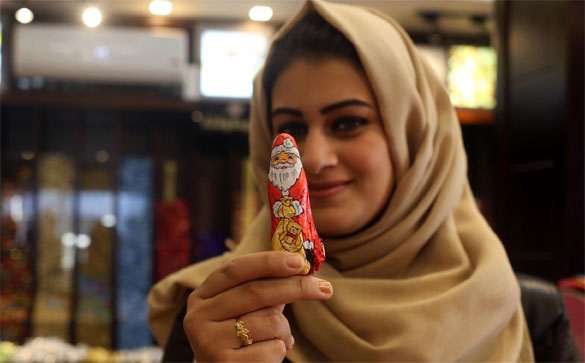
This year Saudi Arabia has allowed Christians living in its territory to celebrate Christmas openly. Untill now, Christians were allowed to celebrate Christmas in expat enclaves only. But thanks to Prince Mohammad bin Salman’s Vision 2030 programme, the Saudi government has allowed Christians to celebrate the festival freely. Malls and shops for the first time were seen selling cakes, Christmas Trees, tinsel, baubles and other gift items.
But with this, the Islamists that stick to conservative and narrow-minded interpretations of Sharia have intensified their campaign against the custom of wishing Merry Christmas to Christians.
In 2012, the Taliban had issued a fatwa declaring that congratulating Christians on Christmas was haram (impermissible). Though modern Islamic scholars like Al Qaradhawi’s view is that there is nothing wrong in wishing Merry Christmas to Christians.
But recently, an official of Hamas Ahmad Kulab in an interview to a TV channel echoed the Talibanic view that saying Merry Christmas was forbidden by Sharia. He went on to say that even if they congratulate Muslims, Muslims should not say anything and remain silent.
But a writer and scholar of Saudi Arabia, Tawfiq al Sayf, in his article published in Al Sharq al Awsat (London) on the issue has condemned this attitude of Muslim scholars and jurisprudents. He says in his article that joining in and sharing the joys and sorrows of others is a natural instinct of human beings and this does not require any religious fatwa or ruling. He says someone invented this theory and we repeated it every year. He writes:
“Wishing Christians a merry Christmas or wishing people a Happy New Year is not a matter of religious law and has no connection with any religious ruling which permits (or forbids) it —- for it is not a matter that requires the ruling of a jurisprudent. Even if a jurisprudent was asked about this matter and gave a reply, his reply does not count as a fatwa but rather as a general opinion which had no validity as an obligation or prohibition.”
He also thinks that this act of advising Muslims not to join the celebrations of others is due to the fear that others may corrupt the faith or culture of Muslims. He writes:
“I have a feeling that the tendency to condemn participation in other people’s happy or sad occasion is a part of a broader trend stemming from the inclination to isolate ourselves for fear of being influenced by the (non-Muslim) majority in the world.”
In fact, Tawfiq al Sayf has tried to address and refute the propaganda being spread by the likes of Ahmad Kulab of Hamas who believes that allowing Christmas to be celebrated in Muslim countries will have a bad influence on our children and that wishing Christians on Christmas is an act of Kufr.
It is said that Ibn Taymiyyah had the view that Muslims should not wish Christians on Christmas. And his view was widely circulated by extremist ulema as an interpretation of Quran and Sunnah.
Christmas is a festival and Muslims should share the joys of the People of the Book on this occasion. The Quran enjoins on Muslims to share the joys and sorrow of their close and distant neighbours. One who does not do so cannot be a Muslim.
This article was first published in https://www.newageislam.com/